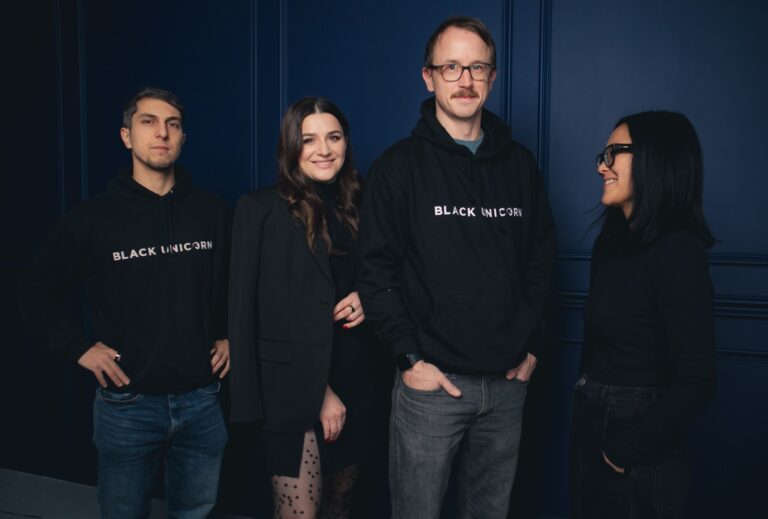Black Unicorn PR was born in London almost 6 years ago now. However, anyone that knows us can tell that there is a strong Baltic connection. Why? Our founder, JJ, is a Lithuanian national, and grew up in Vilnius before moving to the UK to study. After founding Black Unicorn PR, her roots brought her to do business in Lithuania. The timing was impeccable, she had just worked in tech PR for years in London, and at the time the Baltic scene was beginning to bubble with excitement over this new industry.
Over the last few years, we’ve been proud to help disseminate the message about Baltic startups and the Baltic ecosystem, so much so that we decided to take a trip down memory lane. Join us!
🇱🇹 Lithuania
Our Baltic adventure started around 2019, nowhere other than in JJ’s home country of Lithuania. We had some presence in the country already by way of giving some of the first startup PR presentations there. Eventually, Black Unicorn PR was hired by Tinggly, a fast-growing ecommerce helping people gift experiences instead of material presents. A more techy and international play on the model of experience gifting that exists at a national scale in many countries. But strengthened by a deep desire to benefit the planet by doing away with material gifts that, let’s face it, most people end up not using anyways. It was also about people’s wellbeing – experiences create positive memories that last a lifetime. The objective was clear: to crack international PR.
Little did we know, Tinggly would soon end up in The New York Times. Admittedly, with a small mention, but one that would help it get picked up for another mention in none other than Harvard Business Review. Brand equity, here we come! Tinggly continued rising to the top with Business Insider dedicating an article to them. It was thanks to their vision dedicated to shifting people’s mentality around gifting. From there on, we also got Tinggly into The Times and in various gift guides from The Guardian, METRO, Stuff, Forbes, Esquire and many more. Tinggly have been well set up with a stellar in-house team for a while now, and have taken sales to new heights.
Our second adventure was with Millo, the creators of the blender of the future. Millo had been through an outstanding Kickstarter campaign, in which they garnered huge support and validation. At the time, such international traction on Kickstarter was very unusual for Lithuania. They had gotten some articles in international media, but wanted to take their game to the next level. PR was the next frontier. After working together for a bit, we were delighted to see them featured in media brands such as The Guardian, The Next Web, BBC Click (really cool filming during CES) and none other than the print edition of WIRED (online also, of course), where it got a whole page with a giant photo of the blender and was also selected as top gear of the year!

🇱🇻 Latvia
We were finally ready to take on our second Baltic country. The Estonian startup factory had to wait, because first we were flying to Riga to meet a very special startup, Nordigen. Very early on we realised the CEO had a unique charm. Ambitious and straightforward, yes. But leading in a very genuine, humble and friendly way. And he knew his open banking stuff better than anyone else. Or at least, he was the best at explaining it!
Five minutes in, we knew Nordigen would be able to provide lots of value for any journalist wishing to understand open banking better. At that time, open banking was exploding as a topic. It was hot in the media but, at the same time, a bit confusing. Not everyone understood what it was or what it could do. It seemed like everyone was talking about it without understanding it. But here was a guy that could demystify it.
A number of early wins with comment inclusions for Sifted (here and here), a podcast / fireside chat with 11FS seemed impossible to peak. But the team’s incredible tech talent came up with a lean, mean open banking platform that could offer what others were charging for, for free. Nordigen landed a TechCrunch article dedicated to its platform launch (unusual for an early stage startup, which usually requires funding in their story).
The rest was history. Thanks to Nordigen’s perfect combo of founders and team, eventually experimenting with marketing as well as they did with the iterating and learning on the product side. So it wasn’t at all surprising they exited to GoCardless.

The first meeting with Nordigen – open banking immediately broken down on the whiteboard. Five minutes in we knew they were gonna go far, including with PR. A founder motivated and involved in PR can really move the needle – and excite their teams and partners about what they’re doing!
An unusual client was Jeff App (not to be confused with Spanish laundry-Jeff), a fintech startup based in Latvia but exclusively serving the Southeast Asian market. Their focus at the time was exclusively on Vietnam. This would really catch the attention of journalists, we thought. They raised two rounds in quick succession, and both got into TechCrunch. Jeff App was flying, PR-wise.
Latvian fintech founders, ladies and gentlemen!
🇪🇪 Estonia and Baltic diaspora 🇩🇪 🇿🇦 🇮🇩
At the time we started working with Lithuanian and Latvian startups, Estonia was way ahead in the game. So when we got there, getting top international media coverage for these startups felt less like an adventure and more like a hygiene need. But the same was now true of Lithuania and Latvia. At the end of 2019 Lithuania got its first unicorn in Vinted. Latvia seemed close to getting one and got it in early 2021. In any case, by 2020, all Baltic startups were beginning to be seen differently. Estonia was not anymore such a singular place – though it dominated significantly. And we have to say – the Estonian government and agencies did a hell of a job building the identity of a digital-savvy, startup nation. Once the pandemic fears went away, more VC money than ever before started pouring into the Baltics.
However, around 2020 we also started working with Estonians. And we have not looked back! These guys know how to build international businesses. We have seen Planet42, INZMO (who by the way, are now headquartered outside of Estonia), eAgronom and others growing as companies in the last years. Planet42 has been everywhere anyone can be, from Bloomberg to Reuters and beyond. INZMO’s Meeri has become a leading voice in insurtech. Robin is a frequent speaker at podcasts, events and contributor to publications, became a Forbes 30 under 30, and eAgronom operates across multiple continents. Finfra is a fintech startup in Indonesia led by an Estonian and a Latvian. We can’t get enough of Baltic folks doing their thing abroad!
And of course, there is Europe’s most prolific startup accelerator-fund, Startup Wise Guys. Apart from often being first believers in founders that may seem to at first lack business skills, they are excellent advocates for the Baltic region, CEE and other overlooked markets. We’ve seen them consolidate in the Baltics, expand to Italy, and now they’re making waves in many more places, notably Spain.
Estonia, which must surely, by far, have the biggest startup founders per capita, is also where we ended up working the most on deal announcements. There are lots of funding deals to announce from there. So many that TechCrunch, tech.eu and Sifted should get a dedicated Estonia correspondent (kudos Fiona for moving there). It’s been fun working on individual projects with the likes of Outvio and Klaus. The latter is likely to be one of the most creative B2B startups on the planet, if you don’t believe us check out the photo they used for their fundraise announcement. That photo moved mountains for sure, so make sure you get your startup photography, folks!

Photo by Brandcakes / Mardo Mannimagi
The Vilnius ecosystem
In 2020, we noticed that Lithuania had a considerable number of women founders of fintechs. It looked like per capita it could be much, much more so than others like France or Germany. We contacted some founders and ecosystem leaders, collected some data and pitched Sifted. It triggered two articles that got Lithuania included. Great way to grow the brand equity for the country’s fintech and put them on the fintech-startup map (articles here and here). We continued to grow Vilnius’ reputation as a fintech hub in several other publications, pretty much spreading the world in all the fintech media and several tech and mainstream outlets.
In 2021, when TechCrunch still did their city surveys, we saw there was nothing on any of the Baltic cities. Immediately we went after input from several key players from Vilnius and pitched, landing this beautiful piece with the unmissable hot air balloons as the main image. Good choice, Mike! Unfortunately, the series got discontinued shortly after (why, Mike!?). Otherwise, you would have surely seen articles for Riga and Tallinn we had lined up. Yes, we had reached out to their entire ecosystems for nothing. Sorry again to those in Riga & Tallinn that gave us the input!

Back when city ecosystems had their days in the sun.
In 2023, we brought Zosia from Sifted to Vilnius. As opposed to trying to arrange the entire schedule to the last detail in advance, the premise was to give her choice in order to make her trip as memorable as possible. There would be cultural outings to get to know the soul of the city. And we’d also do our best so she could talk to the startups and people in the city that she most wanted to. A few articles came out as a result, but none cooler than the one titled “’The G-spot of Europe’: how Vilnius is trying to attract international tech talent”.
If you haven’t yet, check out the Sifted podcast from June this year. The part about Vilnius starts around 18:00. Zosia mentions the story of Gediminas hoping to bring prominence to Vilnius 700 years ago through letters he sent to hang on the doors of thousands of European churches. Proud moment hearing that! It had come up in our Vilnius tour with likely the best local tour guide, Lina Duseviciene.
If Gediminas hadn’t written those letters inviting people to Vilnius almost a thousand years ago, would we be writing this blog post? Would there be a tech scene in Lithuania? Where would we all be? The pod also had a reference to the G-Spot marketing campaign by the city to attract tourists, which won multiple awards, connecting it to Gediminas’ letters and now the startup ecosystem’s opening arms for new arrivals.
It was topped off with a great summary of what is going on in the startup scene in Vilnius in 2023. Namely, people are so enthusiastic that you can feel the air around them vibrating. But seriously, 700 years later, we agree with Gediminas – you should come check it out (pssst any tech journos wanting to – just let us know 😉) (damn, we’re pitching even in our blog posts).
🤩 🚀 A bright future for the Baltic startup ecosystem
There have been more clients and projects, but we didn’t want to turn this blog post into a name dropping exercise. The most important takeaway is that, in very few years, we have seen the Baltic ecosystem mature at an incredible pace, and we were happy to have played a tiny role in the PR side of it.
There is a combination of bootstrapped startups and tech companies, VC-funded startups that have taken it to the next level and become unicorns or close to, and thriving startups on their way to profitability. But also a different kind of maturity. Founders know the marketing game much better than they used to. When we arrived, there was a particular agency passing off press wires as legitimate PR activities for startups. And they were getting hired by legit startups! Other agencies were (and many still are) replicating the model that unfortunately is a thing in local Baltic markets. That of simply firing press releases whether newsworthy or not.
Founders in Baltic startups are teaming up with other founders, a kind of founder community we don’t see in some bigger markets. We’ve seen many startups where the founders are from more than one Baltic country. Founders are getting over their traditional weaknesses. They are curious to learn how PR works and get better at it. They are now proud to say they are Baltic (when we first came here, a lot preferred to avoid it). A lot of credit goes to some of the great VCs that have played a huge role in promoting the region and making that happen.
There’s still a bit to go, but for sure the future is bright. New agencies (not just PR) serving startups are popping up to fill the marketing gap, and we are seeing more new homegrown tech PR talent and a vibrant marketing community emerge. Unicorns, dragons, cockroaches, or whatever they may be, the Baltics will have them!
How did you like this somewhat different blog post? Would you enjoy more BUPR corporate stories? Let us know!



